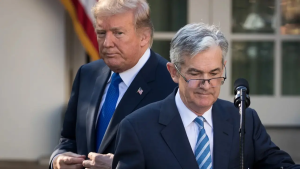Rick Scott tariffs have become a focal point in the ongoing debate about U.S. trade policy, especially regarding China trade relations. During a recent discussion, the Republican senator defended these tariffs as a strategic move to assist American workers by leveling the global playing field. He believes that imposing tariffs will compel other countries to eliminate their trade barriers, thereby allowing U.S. products to compete more effectively abroad. However, the impact of this tariff strategy has sparked concern among economists and policymakers, who worry about potential inflation impacts on the American economy. As the U.S. navigates this complex landscape, the implications of Scott’s tariffs continue to provoke discussions on how best to support American industries while managing global trade relationships.
The tariffs proposed by Senator Rick Scott represent a significant shift in how the United States approaches international trade and economic competition. By implementing these duties, Scott aims to enhance support for American laborers and protect domestic industries from foreign competition, particularly from nations like China, which he views as a major threat. The senator’s approach reflects a broader strategy aimed at reshaping U.S. trade policies to better benefit American workers while addressing issues of trade imbalance. However, the potential repercussions of these tariffs, particularly regarding inflation and their effectiveness in fostering advantageous trade negotiations, remain hotly debated among economists and business leaders alike. As the nation grapples with these complexities, the conversation around Scott’s tariffs emphasizes the need for a careful balance between protecting American interests and maintaining healthy international trade relations.
Understanding Rick Scott’s Tariff Strategy
Senator Rick Scott’s approach to tariffs is fundamentally rooted in his belief that they serve as a strategic tool to bolster U.S. trade interests against global competitors, particularly China. By supporting the tariff strategy initiated during the Trump administration, Scott argues that these measures are designed to pressure other countries to eliminate their own trade barriers, creating a more level playing field for American businesses. He believes that reducing trade barriers will enable American workers to sell their products more effectively and invigorate domestic manufacturing.
Critics of this strategy, including economists like Jason Furman, argue that such unilateral tariff actions risk fostering economic instability, as evidenced by the volatility in global stock markets and significant contractions in the GDP. The debate around whether these tariffs genuinely benefit American workers or inadvertently harm the economy is ongoing, raising questions about the efficacy of the U.S. trade policy in a rapidly changing global landscape.
The Impact of Tariffs on American Workers
Scott’s stance on tariffs emphasizes their potential to empower American workers by reducing disadvantages they face in the global market. He asserts that tariffs can lead to increased sales opportunities for U.S. goods abroad, particularly when other countries are forced to lower their own tariffs in response. The senator’s rhetoric consistently highlights a commitment to protecting American jobs and ensuring that U.S. manufacturers can compete on equal footing with foreign counterparts.
However, the inflation impact of such tariffs raises concerns among economists and the general public. As Scott himself acknowledged, there is uncertainty surrounding how these trade barriers will affect prices for consumers. If tariffs lead to higher costs for imported goods, consumers may ultimately bear the brunt of this trade strategy, which could undermine the very benefits Scott seeks for American workers.
China Trade Relations: A Growing Concern
Senator Scott’s focus on tariffs correlates with a broader concern regarding trade relations with China. He perceives China not just as a competitor but as a significant threat to American economic stability and security. In Scott’s view, disentangling the U.S. economy from Chinese trade practices is imperative to safeguarding national interests. His extreme stance suggests that without aggressive tariff measures, the U.S. risks maintaining an unhealthy economic dependency on a regime he perceives as antagonistic.
While Scott advocates for a tough tariff strategy against China, the potential consequences of such a hardline approach are numerous. Trade relations are complex, and the escalation of tariff rates could incite retaliatory measures from China, potentially leading to a trade war that would impact both economies. This dynamic underscores the need for a balanced approach that considers not only competitive advantages for American workers but also the broader implications for international trade.
Evaluating the Economic Consequences of Tariff Policies
The economic consequences of tariff policies initiated under the guidance of figures like Rick Scott are multifaceted. Proponents argue that these tariffs are essential in correcting trade imbalances and protecting American manufacturers from foreign competition. They believe that by implementing higher tariffs, the U.S. can create an environment that nurtures local industries and supports job growth within the country.
Conversely, critics warn that such a protectionist approach can inadvertently lead to increased costs for consumers and stunted economic growth. The upward pressure on consumer prices due to higher tariffs risks fueling inflation, challenging the economic interests of the very American workers the tariffs are meant to protect. As the U.S. navigates this contentious trade policy landscape, the long-term implications of these tariffs must be carefully considered.
Balancing Tariffs and Inflation Concerns
One of the critical challenges in discussing Rick Scott’s tariff strategy is the balance between protecting American labor and the potential inflationary pressures these measures can invoke. While Scott argues for tariffs as a way to enhance the competitiveness of American products abroad, there is a palpable fear that imposing tariffs will also drive up prices domestically. This could lead to inflation that disproportionately affects everyday consumers who are already grappling with rising living costs.
The conversation surrounding tariffs and inflation is further complicated by the current economic climate, where other factors such as supply chain disruptions and global market fluctuations also play crucial roles. Policymakers need to carefully weigh the advantages of protecting U.S. jobs through tariffs against the risk of inflation that could harm the broader economy. Ultimately, finding a balance that fosters growth while mitigating inflation will be key to the success of any tariff strategy.
Rick Scott’s Perspective on U.S. Trade Policy
Rick Scott’s perspective on U.S. trade policy is fundamentally shaped by his belief in the importance of a strong national position against foreign competition, particularly from China. This point of view aligns him with a faction of U.S. lawmakers who advocate for a robust approach to trade negotiations, including the use of tariffs. Scott believes that without a firm stance, American businesses could fall prey to unfair practices by foreign competitors, thus undermining the potential for domestic growth.
The senator’s assertions reflect a broader ideological shift within U.S. trade policy that prioritizes national interests over international cooperation. By advocating for increased tariffs, Scott aims to steer U.S. trade policy towards protecting American jobs and ensuring a balance of power in global commerce, a strategy he believes is essential for the U.S. to maintain its competitive edge.
The Role of Tariffs in Closing the Trade Deficit
Senator Scott posits that implementing tariffs could be a pivotal strategy in addressing the U.S. trade deficit. By increasing the cost of imported goods, tariffs are believed to encourage consumers and businesses to favor domestic products, ultimately supporting American manufacturers in their efforts to boost production and sales. Scott sees this as a direct means of closing the trade gap that has long been a point of contention in U.S. economic policy.
However, the effectiveness of tariffs in reducing the trade deficit remains a topic of heated debate among economists. Critics argue that while tariffs may lead to a temporary increase in domestic production, they can also result in retaliatory tariffs from trading partners, harming exports and potentially negating any benefits. Consequently, Scott’s approach raises questions about the long-term viability of tariffs as a sustainable solution for diminishing the trade deficit.
Risks and Rewards of Tariff Implementation
The risks and rewards associated with tariff implementation are central to the ongoing debate surrounding Rick Scott’s tariff policy. Proponents argue that tariffs can shield American workers and industries from unfair foreign competition, fostering a more robust domestic economy in the long run. The underlying assumption is that by creating protective barriers, the U.S. can promote job growth and enhance economic resilience.
On the other hand, the risks of implementing such policies can have extensive consequences for both consumers and the economy at large. Tariffs may escalate into trade wars, leading to significant economic retaliation from affected nations. This could create an unpredictable market environment that ultimately harms American consumers as prices rise and supply chains are disrupted. Thus, a careful evaluation of the various potential outcomes of tariff strategies is essential.
Negotiating Trade Agreements vs. Tariff Policies
Rick Scott’s emphasis on tariffs raises an important question about the efficacy of direct negotiations with trading partners versus the imposition of tariffs. Some experts argue that proactive discussions and comprehensive trade agreements could yield more favorable outcomes for American workers without the adverse side effects associated with tariffs. Scott’s position, focused on tariffs as a means of pressure, suggests a belief that negotiations may not be effective with nations like China, which he believes will not engage fairly.
However, this approach can also limit the U.S.’s ability to build cooperative economic relationships that could lead to mutually beneficial arrangements. Fostering dialogue and understanding with trading partners might mitigate the risks associated with tariffs, potentially leading to stronger alliances and a more stable global economy for American workers. The trade-off between utilizing tariffs and negotiating agreements warrants careful consideration in the context of long-term economic strategy.
Frequently Asked Questions
What are Rick Scott’s views on tariffs and American workers?
Rick Scott advocates for tariffs as a means to level the playing field for American workers. He believes that imposing tariffs will help U.S. manufacturers by eliminating trade barriers, enabling them to sell more products globally and reducing the competitive disadvantage faced by American workers.
How does Rick Scott’s tariff strategy relate to U.S. trade policy with China?
Rick Scott’s tariff strategy is closely tied to U.S. trade policy with China. He emphasizes the importance of imposing tariffs to pressure China into removing its own barriers on American products, aiming to eliminate trade inequities and protect American jobs while addressing concerns about China’s economic dominance.
What impact do Rick Scott’s tariffs have on inflation?
Senator Rick Scott has expressed uncertainty about the direct impact of tariffs on inflation, acknowledging that they could influence price levels. He believes controlling inflation hinges more on achieving a balanced budget than on tariff policies alone.
How do tariffs under Rick Scott’s proposals affect U.S.-China trade relations?
Under Rick Scott’s proposals, tariffs are seen as a tool to reshape U.S.-China trade relations. Scott argues that aggressive tariff measures are necessary to combat unfair trade practices from China and to protect U.S. interests, claiming that this approach will ultimately benefit American workers.
What consequences have Rick Scott’s tariffs had on the U.S. economy?
Rick Scott’s tariffs, particularly those targeting China with rates as high as 145%, have contributed to volatility in global markets and were cited as factors in the contraction of the U.S. GDP. Critics, including economists, contend that these tariffs may have negative repercussions for the broader economy, potentially affecting consumer prices and economic growth.
Does Rick Scott believe that negotiating trade agreements is better than imposing tariffs?
While Rick Scott acknowledges the complexities of trade negotiations, he leans towards the effectiveness of tariffs over lengthy negotiations, suggesting that a straightforward tariff strategy could simplify trade relations and be more beneficial for American workers.
What long-term goals does Rick Scott have regarding tariffs and U.S. manufacturing?
Rick Scott’s long-term goal regarding tariffs is to enhance the competitiveness of U.S. manufacturing. He seeks policies that will support American workers by removing trade barriers and ensuring that U.S. products can compete fairly in the global market, particularly against countries like China.
| Key Points | Details |
|---|---|
| Rick Scott’s Stance on Tariffs | Scott supports tariffs as a way to benefit U.S. workers and pressure other countries to lower their tariffs. |
| Impact on U.S. Economy | Scott argues tariffs will eliminate disadvantages for American workers, contrasting with concerns from economists like Jason Furman who warn of negative economic impacts. |
| Tariffs on China | A 145% tariff has been imposed on China, which has retaliated with a 125% tariff on U.S. goods. |
| Critique of China | Scott views China as a serious competitor and believes trade with them is potentially harmful. |
| Concerns on National Debt | Scott emphasizes the importance of a balanced budget and controlled spending to improve fiscal health. |
| Uncertainty on Inflation | Scott is unsure how tariffs will affect inflation but believes a balanced budget is key to addressing it. |
Summary
Rick Scott tariffs are a contentious topic that reflects the senator’s views on how trade policies can support U.S. workers by leveling the playing field against international competitors. While he defends the tariff strategy initiated during the Trump administration as necessary to protect American jobs, the economic implications remain heavily debated among experts. Scott’s position focuses notably on China as a primary threat, advocating for harsher tariffs while promoting a narrative that prioritizes U.S. economic strength.





